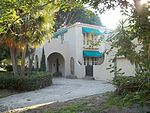Ca' d'Zan

Cà d'Zan () is a Mediterranean revival residence in Sarasota, Florida, adjacent to Sarasota Bay. Cà d'Zan was built in the mid-1920s as the winter retreat of the American circus mogul, entrepreneur, and art collector John Ringling and his wife Mable Burton Ringling. The name Cà d'Zan means "House of John" in the Venetian language, in Italian it would be "Casa di Giovanni". Built in 1926 by Owen Burns, Cà d'Zan is a large Mediterranean revival residence that features an eclectic array of architectural styles including Venetian Gothic, Italian Renaissance, Moorish, and Spanish-inspired elements drawn from different historic periods. Mable and John Ringling had visited Venice and the Venetian Gothic influence in the house is prominently seen in a variety of architectural elements in the decorative program, such as windows with Gothic arches and terra cotta ornament replicating Gothic tracery.
Excerpt from the Wikipedia article Ca' d'Zan (License: CC BY-SA 3.0, Authors, Images).Ca' d'Zan
College Drive, Sarasota
Geographical coordinates (GPS) Address Nearby Places Show on map
Geographical coordinates (GPS)
| Latitude | Longitude |
|---|---|
| N 27.383055555556 ° | E -82.564722222222 ° |
Address
Ringling Museum Complex
College Drive
34270 Sarasota
Florida, United States
Open on Google Maps








